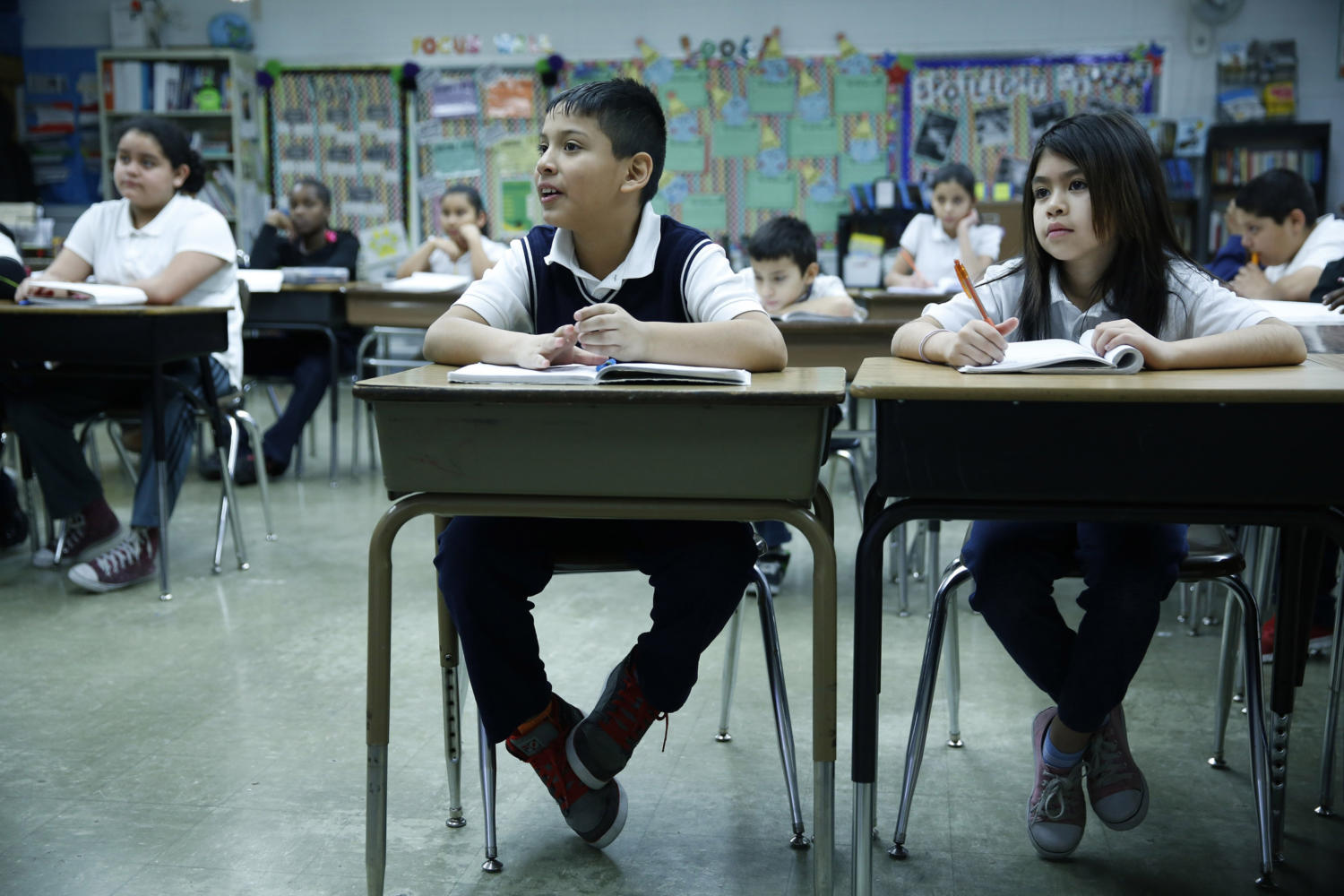What you need to know to apply for state’s new private school scholarships
Students work on their math in instructor Tasia Fields fourth grade classroom at Carman-Buckner Elementary School Jan. 22, 2016 in Waukegan, Ill. (Jose M. Osorio/Chicago Tribune/TNS)
September 6, 2017
Local families who want to send their children to private schools but can’t afford the tuition price tag might be able to apply for new scholarships.
Illinois’ private school scholarship program was created by the public school funding bill that Gov. Bruce Rauner signed into law on Thursday.
The scholarships will be funded by donations from individuals and businesses. The bill includes a controversial provision offering $75 million in tax credits for those donors starting Jan. 1, 2018, to encourage them to participate.
Advertisement
Students’ eligibility to receive scholarships depends on their parents’ income. The bills states that students are eligible if the family’s household income is below $73,800 for a family of four.
Nonprofit “scholarship granting” organizations will be in charge of collecting the private donations and doling out the money. When they’re deciding which students to give scholarships to each academic year, the nonprofits will give priority to certain groups, including:
- Students from families with a household income below 185 percent of the federal poverty level — or $45,510 for a family of four.
- Students who received private school scholarships during the previous school year. And after a student receives a scholarship, the family can see an increase in income and still be eligible — from $73,800 to $98,400 for a family of four, for example.
- Siblings of scholarship recipients.
- Students who live in a school district that has a low graduation rate or a district that has groups of students with low test scores, which are known as “focus districts.” There are eight local school districts that would fall into this category, according to information from the Illinois State Board of Education: Alton 11, Cahokia 187, Coulterville 1, East St. Louis 189, Granite City 9, Roxana 1, Sparta 140 and Centralia 200.
The state board identifies these districts to determine where to send aid through school improvement grants or other help through an Illinois center for school improvement.
Granite City students are among those who would get priority when applying for the private school scholarships, but Superintendent Jim Greenwald said he doesn’t expect to see Granite City District 9 schools lose students.
“I think the public schools offer in many cases a more comprehensive curriculum in some areas, such as math and science, vocational,” he said.
Greenwald said the new money allocated for public schools under the bill will allow educators to consider buying things like new textbooks or technology when they had previously been making cuts to get by without adequate state funding. “We are going to be better off financially because of this plan,” he said.
Scholarship amounts will be based on whichever is less: the tuition and fees for the private school the family chooses or the average per-student spending on operational expenses in the public schools, which was $12,821 during the 2015-16 school year, according to state data.
Advertisement*
The state plans to give more money to students from families with the lowest incomes. That means families with higher incomes will receive a percentage of the scholarship value. For example, a family of four whose household income is between $73,800 and $61,500 would on average get half of the scholarship amount.
The students who will be given priority because their family’s household income is below 185 percent of the federal poverty level will get the full scholarship amount rather than a percentage, the bill states.
Scholarships will be available for the 2018-19 school year through the 2022-23 school year. The program ends after five years unless lawmakers decide to extend it.
The bill requires the scholarship granting organizations to make efforts to advertise the scholarships to eligible students.
They will start giving out scholarships no later than Feb. 1 before each school year, according to the bill. The priority groups will be eligible to receive scholarships on a first-come, first-served basis until April.
Starting April 1 each year, all eligible students can start receiving scholarships.
After students receive a scholarship, parents will find out whether their child’s academic performance is improving at a private school in two ways.
The private schools that begin taking in new students because of the scholarships will be required to provide parents with a written explanation of their child’s progress, the bill states.
Then, starting in the 2019-20 school year, students who receive the scholarships and begin attending private schools will also take a state assessment like their public school peers. The private schools will be responsible for the testing costs for those students.
The state board of education will pick an independent research organization, possibly a university, to study the “year-to-year learning gains” of students receiving scholarships based on the assessments. It might also include a comparison to the “learning gains” of public school students with socioeconomic backgrounds similar to the students receiving scholarships.
Studies will be paid for by either the state board through donations or grants or by the scholarship granting organizations.
Researchers will submit a report to the state board every year, and it will be published online. Individual students’ identities will be protected, according to the bill.
The state board will use the research to write its own report, evaluating the academic performance of the students receiving scholarships and suggesting recommendations for improving that performance.
___
(c)2017 the Belleville News-Democrat (Belleville, Ill.)
Visit the Belleville News-Democrat (Belleville, Ill.) at www.bnd.com
Distributed by Tribune Content Agency, LLC.
Advertisement








